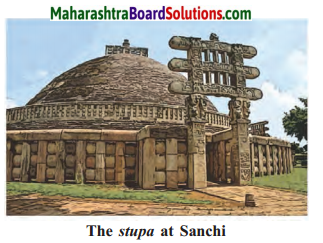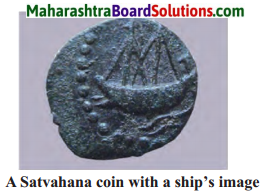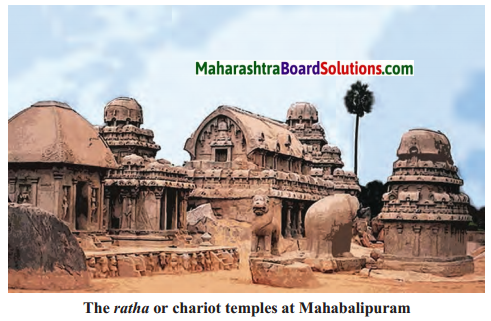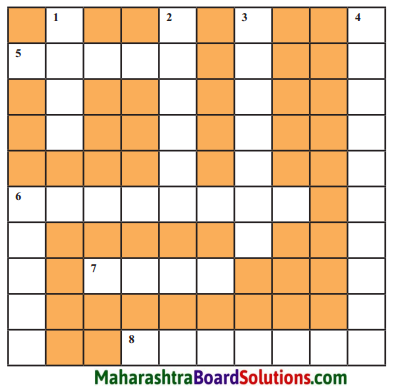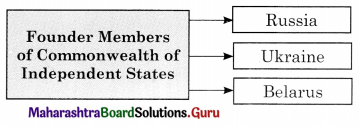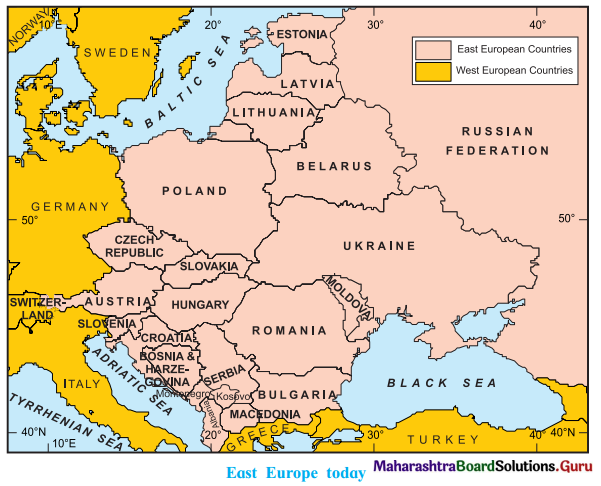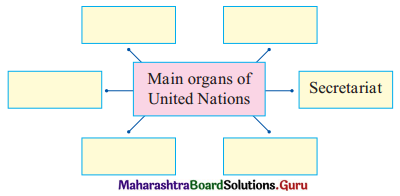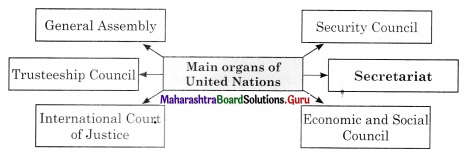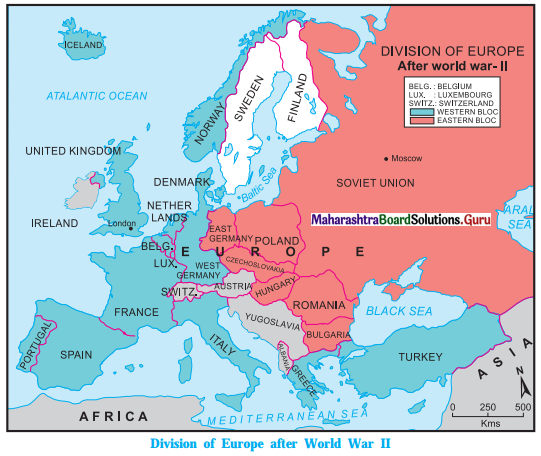Balbharti Maharashtra State Board Class 6 History Solutions Chapter 11 Ancient India and the World Notes, Textbook Exercise Important Questions and Answers.
Std 6 History Chapter 11 Question Answer Ancient India and the World Maharashtra Board
Class 6 History Chapter 11 Ancient India and the World Question Answer Maharashtra Board
Ancient India and the World Class 6 Questions And Answers
1. Name the following:
Question 1.
Places where articles made in Rome were found.
Answer:
Kolhapur and Arikamedu in Tamil Nadu.
Question 2.
A new style of art emerged during the Kushana period in India.
Answer:
Gandhara style of art.
Question 3.
The language of the books Mahavansa and Deepvansa.
Answer:
Pali language.
Question 4.
A country to which Buddhism had spread in the ancient period.
Answer:
Sri Lanka.
2. Think and expand/elaborate:
Question 1.
Indian culture had an impact on southeast Asia.
Answer:
- Indian culture had a deep impact on the art and cultural life of southeast Asia.
- Dance-dramas based on stories from Ramayana and Mahabharata are popular in Indonesia even today.
- In later years, temples of Lord Shiva and Vishnu were also built there.
Question 2.
The spread of Buddhism in China became easier.
Answer:
- In the first century CE, the Ming emperor of China invited the Buddhist bhikkhus Dharmarakshaka and Kashyapmatanga to China.
- The Bhikkhus translated many Indian Buddhist texts into Chinese language.
- This made the spread of Buddhism in China easier.
3. What would you do if you are encouraged in your favourite hobby ?
Answer:
If someone encouraged me, it will make me very happy and boost my self-confidence. Thus I will further expand my horizon by gaining more knowledge and enhancing my hobby.
4. Describe a picture:
A picture of the Gandhara style sculpture on a stupa in Hadda, Afghanistan is given in this chapter. Observe it and write about it.
5. Find out more about:
Question 1.
The Gandhara style of art.
Answer:
Under the influence of the Greek art of sculpture, a new form of art emerged in India during the Kushana period. It is called Gandhara school of art. In the Gandhara, art school images of Gautam Buddha were mainly carved in Gandhara.
Question 2.
The Silk Route.
Answer:
Chinese silk was in great demand in India. Merchants in ancient India supplied Chinese silk to western countries. The land route by which the silk trade was carried on was called the silk route. Some ancient places in India were connected to this route. The Chinese Buddhist Bhikkhus also came to India through this silk route.
6. Mark the countries of Southeast Asia mentioned in the chapter on an outline map.
Activity:
Obtain information about a form of art of your choice and present it in your class.
Class 6 History Chapter 11 Ancient India and the World Additional Important Questions and Answers
Complete the sentence by choosing the correct option:
Question 1.
People of the Harappan civilisation had developed trade relations with the countries of the ______.
(a) north
(b) west
(c) south
Answer:
(b) west
Question 2.
________ had spread to Afghanistan and to many countries of Central Asia.
(a) Zoroastrianism
(b) Jainism
(c) Buddhism
Answer:
(c) Buddhism
Question 3.
The writings of the Greek historians introduced India to the ______ world.
(a) western
(b) eastern
(c) central
Answer:
(a) western
Question 4.
Under the influence of the Greek art of sculpture, a new form of art emerged in India during the ____ period.
(a) Gupta
(b) Kushana
(c) Vakataka
Answer:
(b) Kushana
Question 5.
In the Gandhara art school images of _______ were mainly carved.
(a) Gautam Buddha
(b) Vardhaman Mahavir
(c) Guru Nanak
Answer:
(a) Gautam Buddha
Question 6.
The early coins that were minted in India were also like _________ coins.
(a) Sri lanka
(b) Chinese
(c) Greek
Answer:
(c) Greek
Question 7.
The excavations at Arikamedu in Tamil Nadu have also brought to light many articles made in ______.
(a) Afghanistan
(b) Rome
(c) China
Answer:
(b) Rome
Question 8.
______was an important port in Egypt.
(a) Funan
(b) Kolhapur
(c) Alexandria
Answer:
(c) Alexandria
Question 9.
Beside Indian goods, the _______ also conveyed Indian philosophy and science to Europe.
(a) Chinese
(b) Arabs
(c) Greeks
Answer:
(b) Arabs
Question 10.
The concept of ‘__________ ‘ is one of India’s major contributions to the world.
(a) zero
(b) one
(c) mathematics
Answer:
(a) zero
Question 11.
Sanghamitra carried a branch of the _________ tree to Sri Lanka.
(a) Banyan
(b) Bodhi
(c) Pipal
Answer:
(b) Bodhi
Question 12.
There was a great demand in India for Sri Lankan _________ and other precious stones.
(a) diamonds
(b) rubies
(c) pearls
Answer:
(c) pearls
Question 13.
The wall paintings in Sigiriya caves bear a resemblance to the paintings in the _______ caves.
(a) Ellora
(b) Ajanta
(c) Nashik
Answer:
(b) Ajanta
Question 14.
Right from the ancient times, India and __________ had established trade and cultural relations.
(a) China
(b) Maharashtra
(c) Rome
Answer:
(a) China
Question 15.
Emperor Harshavardhan had even sent an ambassador to the _______ court.
(a) Greek
(c) Roman
(c) Chinese
Answer:
(c) Chinese
Question 16.
Chinese _______ was known as .’Chinanshuka’ and was in great demand in India.
(a) pearls
(b) diamond
(c) silk
Answer:
(c) silk
Question 17.
Merchants in ancient India supplied Chinese silk to _______ countries.
(a) eastern
(b) western
(c) northern
Answer:
(b) western
Question 18.
The land route by which the silk trade was carried on, was called the ________.
(a) Silk Route
(b) Trade Route
(c) Horse Route
Answer:
(a) Silk Route
Question 19.
The Chinese Buddhist bhikkhus Fa-hien and Yuan Chwang also came to ______ through this silk route.
(a) Nepal
(b) Rome
(c) India
Answer:
(c) India
Question 20.
The bhikkhus translated many Buddhist texts into the _____ language.
(a) Chinese
(b) Japanese
(c) Prakrit
Answer:
(a) Chinese
Question 21.
People of Funan knew ______ language.
(a) Marathi
(b) Chinese
(c) Sanskrit
Answer:
(c) Sanskrit
Question 22.
Indian culture had a deep impact on the art and cultural life of ________ Asia.
(a) Southeast
(b) Southwest
(c) Northeast
Answer:
(a) Southeast
Question 23.
Dance-dramas based on stories from the two Indian epics are popular in ______ even today.
(a) China
(b) Indonesia
(c) Japan
Answer:
(b) Indonesia
Question 24.
In the later years, ______ of Lord Shiva and Vishnu were also built.
(a) caves
(b) muttas
(c) temples
Answer:
(c) temples
Answer in one sentence:
Question 1.
What has India exchanged with the outside world?
Answer:
Having developed trade relations, India began economic and cultural exchange with the outside world.
Question 2.
Who introduced India to the western world?
Answer:
The writings of the Greek historians introduced India to the western world.
Question 3.
Besides Indian goods, what did the Arabs convey to Europe?
Answer:
Besides Indian goods, the Arabs also conveyed Indian philosophy and science to Europe.
Question 4.
Who were sent to Sri Lanka to spread Buddhism?
Answer:
King Ashoka sent his son Mahendra and daughter Sanghamitra to Sri Lanka to spread Buddhism.
Question 5.
Who introduced the Bodhi tree to Sri Lanka?
Answer:
Sanghamitra carried a branch of the Bodhi tree to Sri Lanka.
Question 6.
What is similar between the caves at Ajanta and Sigiriya?
Answer:
The wall paintings at Sigiriya bear resemblance to the paintings in the Ajanta caves.
Question 7.
What provides information about the dose relations between India and Sri Lanka?
Answer:
The Sri Lankan Buddhist works ‘Dipavamsa’ and ‘Mahavamsa’ provide information about the close relations between India and Sri Lanka.
Question 8.
Who sent an ambassador to the Chinese court?
Answer:
Emperor Harshavardhan sent an ambassador to the Chinese court.
Question 9.
What gave an impetus to the spread of Buddhism in China?
Answer:
The Bhikkhus translated many Indian Buddhist texts into Chinese Language. This gave an impetus to spread of Buddhism in China.
Question 10.
In the later years, which temples were built in South-Asian countries?
Answer:
the later years, temples of Lord Shiva and Vishnu were built in south-asian countries.
Elaborate:
Question 1.
Alexandria was an important port in Egypt?
Answer:
The Arab merchants carried Indian goods up to Alexandria. From there, they were sent to the countries in Europe. Besides Indian goods, the Arabs also conveyed Indian philosophy and science to Europe. The concept of ‘zero’ is one of India’s major contribution’ to the world . It was the Arabs who introduced this Indian concept to Europe.
6th Std History Questions And Answers:
- The Indian Subcontinent and History Class 6 History Questions And Answers
- Sources of History Class 6 History Questions And Answers
- The Harappan Civilization Class 6 History Questions And Answers
- The Vedic Civilization Class 6 History Questions And Answers
- Religious Trends in Ancient India Class 6 History Questions And Answers
- Janapadas and Mahajanapadas Class 6 History Questions And Answers
- India during the Maurya Period Class 6 History Questions And Answers
- States after the Maurya Empire Class 6 History Questions And Answers
- Ancient Kingdoms of the South Class 6 History Questions And Answers
- Ancient India: Cultural Class 6 History Questions And Answers
- Ancient India and the World Class 6 History Questions And Answers
